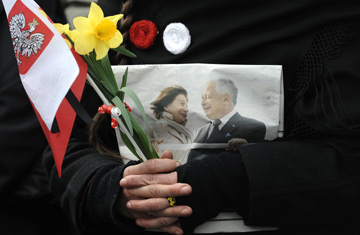
A person holds a Polish flag and a photo of Poland's late President Lech Kaczynski and his wife Maria during a public memorial service in Warsaw
(2 of 2)
These discrepancies, and the blame game they have set in motion, have helped push the notion of a Russian plot to murder Poland's President out of the realm of conspiracy theory and into the Polish mainstream. On Monday, the late President's son-in-law, Marcin Dubieniecki, told Poland's TVN24 news channel that "there are many things that indicate an assassination of Lech Kaczynski." In particular, he named the anti-Russian activism that defined Kaczynski's political career, as well as his support for Georgia in its 2008 war with Russia.
Poland's main opposition party, Law and Justice, which is led by the late President's twin brother Jaroslaw Kaczynski, has now begun accusing Polish Prime Minister Donald Tusk of treason for trusting the Russians to lead the inquiry. With the public outcry over its findings, Tusk is on the brink of a political crisis. On Wednesday, he will go before a session of parliament devoted to the Russian crash probe, and Polish MP Iwinski says the least Tusk could face is a no-confidence vote against one of his ministers as lawmakers look for someone to take the fall. At worst, he could be pushed out of power in the next parliamentary elections later this year.
Ironically, this would rob the Russians of their greatest Polish ally. At the crash site on April 10, Tusk knelt down beside Russian Prime Minister Vladimir Putin in front of a makeshift memorial, and then the two men embraced. But now the Russians are keeping a guarded distance from the political storm their investigation has caused in Warsaw. Putin has made no comment, while his Transport Minister, Igor Levitin, said on Jan. 13, "I see that our Polish colleagues still have questions, but I don't want to be drawn into polemics."
This caginess is only likely to draw more fire from the Poles, popularizing the view that Russia's inquiry was merely a cover-up, says Andrei Illarionov, an analyst at the Cato Institute think tank in Washington, D.C., who was Putin's top economic adviser between 2000 and 2005. "Not only has the investigation failed in its attempt to put all the blame on the Polish pilots, it has had the opposite effect," he says. "The suspicion has now turned toward the Russians."
Yet Evgeny Minchenko, a Russian political strategist and spin doctor, says it could not have been handled any other way. Russia had to keep the Poles away from the Jan. 12 press conference in order to avoid a confrontation, Minchenko says, and once Warsaw's anger subsides, it should still be possible to steer relations toward higher ground: "Putin is a very talented communicator ... He charmed Tusk so much [at their first meeting] that the latter fundamentally changed his tone, and that will remain an important factor going forward."
But in the face of the public fury surrounding the Russian investigation — 46% of Poles believe it was falsified, according to a survey conducted last week by TNS OBOP — succumbing to Putin's charms may mark the end of Tusk's career. So don't hold out for Russians and Poles to hug and call each other brothers again. The wait could last another lifetime.
